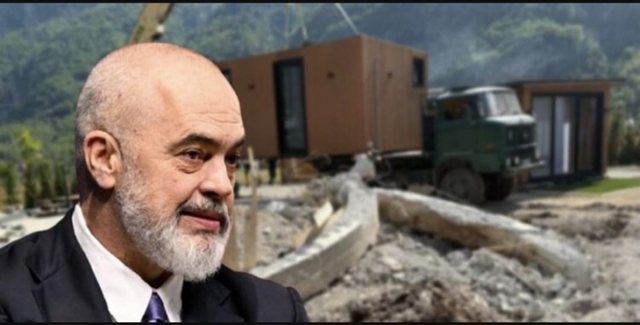
Land of the jinn? Yes, but from Edi!


Private property is not “the land of the khan.” It is a fundamental, natural, inalienable right.
Edi Rama can use all his cynical rhetoric, send in the IKMT, the police and rubber batons, but he cannot hide the truth:
In Theth, the state is not protecting the law, but is hiding its failures under the dust of the streets.
When property is legitimate, it is not "of xanun".
The Land of Xanun is the land that Olta Xhaçka and Artan Gaçi usurped in Himara!
The buildings in Theth are on private land, inherited from generation to generation, kept alive by a community that has chosen not to emigrate, but to build.
No one has taken state land. Those properties are not “occupied,” they are cultivated, developed, and made aesthetic by the sweat, toil, and talent of local residents. They are homes and guesthouses that breathe life into a place that the state has systematically abandoned.
In this context, it is Edi Rama who is usurping private lands with the repressive force of the state.
And it is paradoxical that he calls "the land of the khanun" the one who has failed to bring an urban plan, but brings state violence.
The American tradition of natural law, embodied by John Locke, calls property an innate right, alongside life and liberty:
"Man has the right to life, liberty and property."
Property is not just land – it is labor, sweat, the fruit of life. And this philosophy became a pillar of the American Constitution and all of Western civilization.
In the United States and in any just country, even illegal constructions are not demolished without due process of law, without investigation, without the right to defense, and without fair compensation if it is taken in the public interest. Neither the president nor the king can do this. Because property is sacred.
In Albania, the opposite happens:
The state is weak to plan and strong to punish.
Instead of bringing in architects and regulatory plans, it brings in IKMT and Fatmir Meta in sunglasses as the face of a thug state.
Rama has been in power for 13 years and has had all the time to build:
• an urban plan for Theth,
• rules for traditional construction,
• infrastructure for sustainable tourism development.
But he didn't. Because it's much easier to send in the police than the city planners.
Easier to send in the police than the plan.
Easier to use violence than justice.
The state that does not plan has no right to destroy! This is a fundamental principle of democratic governance:
"Where the state is absent in leadership, it has no right to appear in punishment."
Instead of helping residents improve construction, adapting them to a delayed plan, legalizing them with conditions, and increasing the tourist standard of the area, Rama chooses the spectacle of violence.
A spectacle at the height of the tourist season, precisely when Thethi brings life and hope.
Edi, Thethi is not a "land of the gods."
It is a land cultivated, protected, and developed by people who have stayed away from concessions and affairs, but close to nature, hospitality, and honest work.
And it's a shame that they are punished not for a crime, but for the lack of a state.
Today, Albania faces a fundamental choice:
Will we follow the path of natural law and guaranteed property as in the West, or will we continue with the selective violence of power, where the law is applied as a political weapon?
The choice is clear. And Thethi is giving its answer:
We are not usurpers. We are owners. And our property is not the land of the khan.

The Ukraine summit that ignored the tough questions
ideas
top
Alfa recipes
TRENDING 
services
- POLICE129
- STREET POLICE126
- AMBULANCE112
- FIREFIGHTER128





























